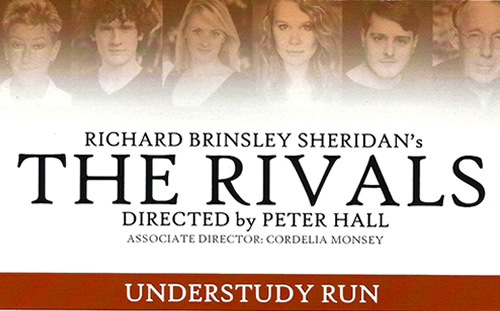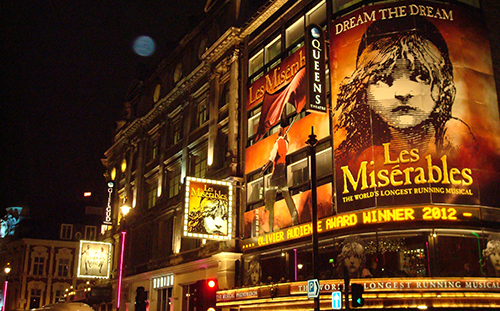
There are a number of reasons why the understudy run of The Rivals at the Haymarket on Tuesday was a delight.
The sheer joy of a packed stalls, filled with agents, casting directors, family, supportive friends and a huge crowd of out-of-work actors all laughing uproariously at a 250 year old comedy was indescribable.
There was the pleasure of watching a cast working in unison and supporting their understudies to turn out a slick, well-oiled performance which would have been worthy of a paid evening show. The palpable camaraderie between the players was evident.
And, a surprising treat, there was a glossy, professionally produced programme which would be a treasured keepsake for some, a useful reference for others.
But as joyful as the run was, and as much as one hopes that the talented understudies will be inundated with offers of representation and auditions, this particular Understudy Run was possible, at least in part, because the enterprising cast were fortunate enough to receive corporate sponsorship, which enabled them, among other expenses, to produce the aforementioned programme. And of course, because everyone involved gave up their time to present an additional, unpaid performance.
Which begs the question – why is the Understudy Run not a contractual obligation? Performances like these rely, far too much, on goodwill. Not every understudy company are fortunate enough to have the close personal relationships that The Rivals cast enjoy. Today, modern companies must necessarily keep an eye on costs- the days when each role had their own understudy are long gone. Now, an understudy is expected to cover two, perhaps three, parts. Some may even undertake ASM duties. Almost all will be expected to act as stage hands and furniture movers. This means that some members of the principal cast will be asked to reprise their roles at an unpaid performance. In the case of The Rivals, some were also asked to undertake non-speaking roles. Fortunately for The Rivals, everyone agreed. But what if they had not? No-one should be forced to work for nothing, but what bad feeling would this create within a company? And what if a cast member, as was almost the case for The Rivals, is unable to attend? What if they are already in rehearsal for their next project? Most Understudy Runs are held toward the end of the run, when lucky actors may already have begun work on the next gig. Where does that leave the hapless understudies? Without a showcase.
Of course, that is the understudies lot, the uncertainty, the will I-won’t I-get-on paradigm. Sometimes, during a long run, a fortunate understudy may get a performance, or two, but that is sadly due to the indisposition of a principal cast member, and frequently does not afford the hapless understudy time to ring their spouse or parent to invite them, let alone their agent, or a potential employer.
The Understudy Run has become a near tradition, but it is not just actors who are involved. The theatre must be manned by FOH volunteers, the wardrobe, wigs, lighting departments must also donate their time – gratis.
Why? Why should professionals in a West End theatre be expected to work, unpaid, as a favour? Why should a performance like an Understudy Run which has become almost the norm for West End theatre, and thankfully so, be reliant on whimsy, caprice and goodwill?
Why, in a professional industry, can the Understudy Run not be enshrined in contract? The financial costs involved are, at worst token, at best minimal. Surely, the TMA and Equity could agree a contractual stipulation that in shows which have a fixed run of, say, four months or more, there is a guaranteed understudy run? And that all reasonable costs are covered. The RSC produces public Understudy Runs, and some production companies do offer an Understudy Run as a contractual obligation, but sadly, by no means all companies obligate themselves in this way.
There are those who will argue that an Understudy Run would place further financial constraints on an already straitened industry – but the current system is untenable in the long term. Some companies are more supportive than others, some theatres more amenable, and, truthfully, some principals less tractable. The Understudy Run exists and has been largely embraced by the industry, let us make it a right, and not a privilege.
-JBR


At last a frank and open assessment of the travails of understudies. The pipe dream of being thrown in at the deep end; and suddenly have the world at your feet….A Star is Born…happens only in motion pictures or at best once in a lifetime. Judy Garland and Julie Andrews remain as the celluloid icons for young female uderstudies who at Saturday afternoon Film Clubs have gloried in and aspired to achieve what they saw on the screen…it just does’t happen…its hard greaft..with little if any praise for their efforts and any who do achieve some sort of recognition will always have some ‘svengali type’ who will trot out the time worn ” I always new they had star quality”…get real nobody would be in the business if they were untalented..of course they have quality..it takes time to make a star and the only way you can achieve stardom is to be given the chance..but not at any cost. Understudies have to get to thier venues…that costs..they have to eat.. that costs..and they have to stay healthy (not an easy task in todays environment) and that costs…would West End productions funtion without understudies..no chance..and as regards Equity ..the spelling slip in JBR’s review … Equity cold…sums up the ambivalence they have towards understudies ….well done JBR its time somebody stood up for the less well off in our industry.